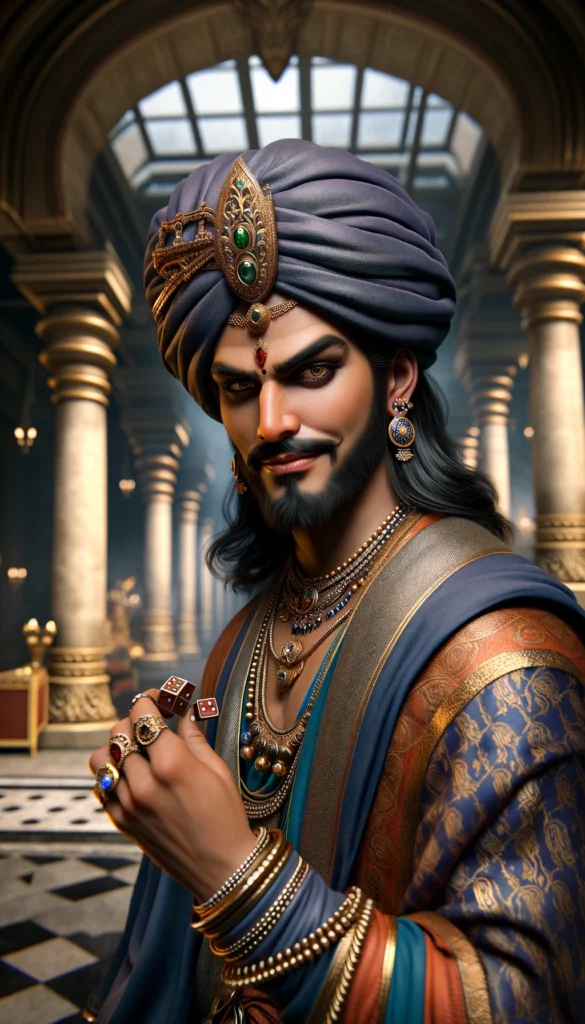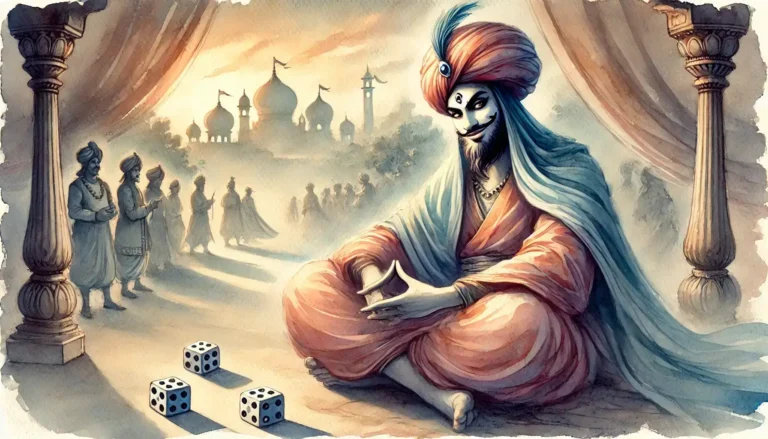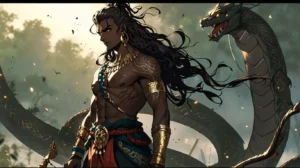The Mahabharata is one of the greatest epics of Indian history. It tells the story of a grand war fought between two groups of cousins, the Pandavas and the Kauravas. The reasons behind this war are many, and one of the key figures who influenced the events leading to this epic battle was Mama Shakuni (Maternal Uncle of Duryodhan).
Shakuni was the uncle of Duryodhan, the eldest of the Kauravas. He played a significant role in shaping Duryodhan’s ambitions and actions. Shakuni was known for his cunning mind and his magical dice, which always rolled the numbers he desired. Because of these dice, the Pandavas were defeated in a game of dice, leading to the humiliation of their wife, Draupadi.
But what motivated Shakuni to do this? What drove him to create such chaos and hatred? To understand Shakuni’s actions, we need to delve into his past.
The Marriage of Dhritarashtra and Gandhari
Before the war of Mahabharata began, a lot of events took place that set the stage for the epic conflict. One such event was the marriage of Dhritarashtra, famously known as the blind king of the Kuru dynasty, to Gandhari, the princess of Gandhar.
Bhishma Pitamah, the grand elder of the Kuru dynasty, was searching for a suitable bride for Dhritarashtra. He learned about Gandhari, the daughter of the king of Gandhar, a small kingdom believed to be in the region now known as Afghanistan.
Bhishma approached Gandhar Naresh, Gandhari’s father, with a marriage proposal for Dhritarashtra. However, Gandhar Naresh was hesitant because Dhritarashtra was blind. Despite his reluctance, Gandhar Naresh could not refuse the powerful Kuru dynasty, so he agreed to the marriage.
The Secret of Gandhari
After the marriage, Bhishma discovered a shocking secret. Gandhari was a Manglik, a person believed to bring misfortune to their spouse according to Hindu astrology. To counter this bad luck, Gandhari had been first married to a goat, which was then sacrificed. This ritual was meant to transfer the bad luck to the goat.
When Bhishma learned about this deception, he felt betrayed. In his anger, he invited Gandhari’s entire family to Hastinapur, the capital of the Kuru kingdom, under the pretense of welcoming them.
The Tragic Punishment
Upon their arrival, Bhishma confined Gandhari’s family to a small cell and gave them only one handful of rice each day. This meager amount of food was not enough to sustain them, and they began to die one by one.
Among the family members was Shakuni, Gandhari’s brother, who was determined to survive. The family decided that Shakuni should eat all the rice so that he could live. Every day, Shakuni watched his loved ones die of starvation.
Shakuni’s Vow of Revenge
Before his father died, he broke Shakuni’s knee to remind him of their suffering and ensure he would never forget their plight. He also instructed Shakuni to make dice from his bones, which would always show the numbers Shakuni desired.
With this act, Shakuni’s father instilled in him a burning desire for revenge against the Kuru dynasty. Shakuni vowed to destroy the Kurus for the pain they had inflicted on his family. He used his magical dice to defeat the Pandavas in a game, leading to their downfall and Draupadi’s humiliation, which eventually sparked the Mahabharata war.

Shakuni’s Role in the Mahabharata
Throughout the epic, Shakuni manipulated events to fulfill his vow. He played a central role in poisoning Duryodhan’s mind against the Pandavas, leading to numerous schemes and plots. His ultimate aim was to see the destruction of the Kuru dynasty.
During the war, Shakuni witnessed the deaths of many key figures, including Bhishma Pitamah, Guru Dronacharya, Karna, and Dushasan. He saw the complete annihilation of the Kauravas and felt a grim satisfaction in having fulfilled his promise to his father.
Shakuni’s End
On the 18th day of the war, Sahadev, one of the Pandavas, challenged Shakuni to a duel. Sahadev was wise and knew about Shakuni’s motivations and past. He tried to convince Shakuni to stop the war, telling him he had achieved his revenge and should return to Gandhar to rule.
In a rare moment of openness, Shakuni shared his life story with Sahadev, recounting his childhood, the suffering of his family, and the many crimes he had committed. He admitted that he could no longer bear the burden of his actions and wished for an end.
Despite his remorse, Shakuni attacked Sahadev, knowing it would lead to his death. Sahadev fought bravely and eventually beheaded Shakuni, ending his life of revenge and fulfilling his destiny.
Shakuni’s story is one of pain, revenge, and loyalty to his family. His actions were driven by the immense suffering he endured and his promise to avenge his family. This tale is a crucial part of the Mahabharata, showcasing the complex characters and deep emotions that make the epic so compelling.
If you want to learn more about the untold stories of the Mahabharata, stay tuned for more untold stories.
Also, you can read the 18 Days of Mahabharat



